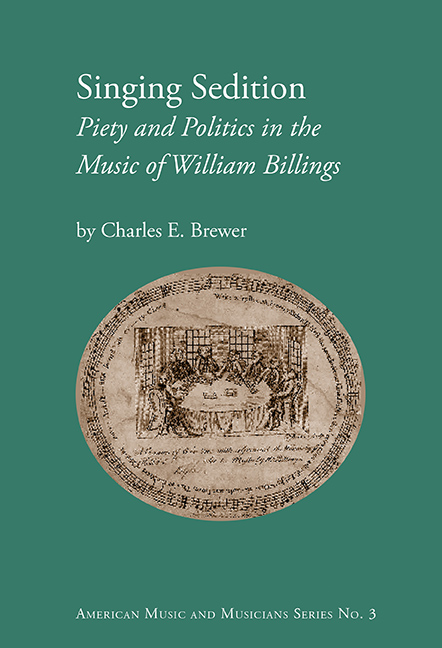Book contents
- Frontmatter
- Table of Contents
- List of Illustrations, Musical Examples, and Tables
- Prologue
- Acknowledgements
- Abbreviations
- Part I Rebellious Voices in Billings's Boston
- Part II Singing the Rebellion
- Chapter Three Shiloh and the Meanings of Christmas
- Chapter Four Billings's Anthems: Lamentation to Independence
- Chapter Five “Victory that Day was Turned into Mourning”
- Chapter Six “I Am the Rose of Sharon”: Rev. Samuel Cooper and William Billings
- Chapter Seven “Peace be on Earth, Good Will towards Men”
- Epilogue
- Appendices
- Bibliography
- Index
Chapter Four - Billings's Anthems: Lamentation to Independence
from Part II - Singing the Rebellion
- Frontmatter
- Table of Contents
- List of Illustrations, Musical Examples, and Tables
- Prologue
- Acknowledgements
- Abbreviations
- Part I Rebellious Voices in Billings's Boston
- Part II Singing the Rebellion
- Chapter Three Shiloh and the Meanings of Christmas
- Chapter Four Billings's Anthems: Lamentation to Independence
- Chapter Five “Victory that Day was Turned into Mourning”
- Chapter Six “I Am the Rose of Sharon”: Rev. Samuel Cooper and William Billings
- Chapter Seven “Peace be on Earth, Good Will towards Men”
- Epilogue
- Appendices
- Bibliography
- Index
Summary
Aside from his own lyrics, important aspects of Billings's creativity were expressed in his anthems, which vary from unchanged settings of biblical passages to original combinations of different biblical texts, other poems, parodies, and even his own newly-composed verse. In fashioning his texts, he was making very personal and interpretive decisions that helped to delineate his intended meanings and which guided his own composition of the music. While for many anthems there are few problems with understanding their intended significance, in some of Billings's anthems for specific and patriotic occasions he draws upon a multivalent understanding of his chosen texts in a much broader cultural context, that in some cases now may be entirely lost. To recreate this context requires an exegesis of his works much as a minister would examine a selected text in a sermon.
Billings included “A Musical Dictionary” in The Singing-Master's Assistant, and his definition of “Anthem” was “A divine song, generally in prose,” which he amplified in The Continental Harmony.
Scholar. What is an Anthem?
Master. It is a divine song, generally in prose, and although I have often heard it disputed, yet I think any piece of divine music, that is not divided into metre (excepting canons and chanting pieces) may with propriety be called an Anthem.
The anthem was the longest and perhaps most difficult music for Americans to compose; McKay and Crawford estimated that of about seven thousand compositions published before 1810, there are only about two hundred anthems. Just a few composers were particularly prolific in this difficult genre, such as Oliver Holden, Jacob French, Amos Bull, Samuel Holyoke, and especially William Billings.
The majority of Billings's forty-nine anthems (approximately one-quarter of all anthems) were published in his larger collections. Ralph T. Daniel posited three stages of development in Billings's anthems: the first, evident in The New- England Psalm-Singer was defined as “more diffuse, more repetitious, and involve more passages in slower tempos” than works from the second and third stages, which were multisectional, and were marked by an “increasing emphasis upon sectional contrast by means of musical devices such as changing meter, tempo, texture, or, occasionally, tonal center.”
- Type
- Chapter
- Information
- Singing SeditionPiety and Politics in the Music of William Billings, pp. 93 - 140Publisher: Boydell & BrewerPrint publication year: 2017



